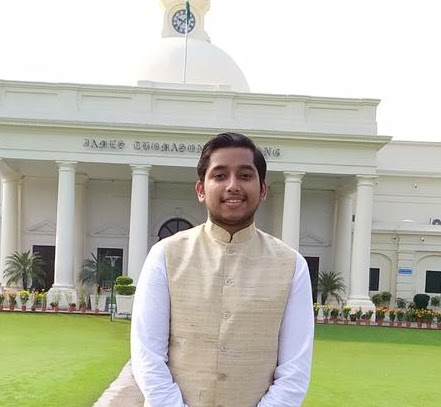
Echoes interviewed Mr. Ritwik Mehta, a 4th-year student majoring in Electrical Engineering with the aspirations and the heart to become a policymaker and leader in the future. He has worked with multiple NGOs and organizations and is currently among the board of directors at Sakonsa. With his heart set in politics, he has founded a policy think tank start-up NITITANTRA which aims to provide in-depth and constructive policymaking to build and strengthen our nation.
Q. You are among the board of directors at Sakonsa, an organization that strives to promote sustainable development goals to the young generation. What's been the driving force around the initiative? How are you utilizing your position to influence change in the present and the future?
I joined Sakonsa in April 2021 as a marketing assistant since Sakonsa focused on improving education and awareness in rural areas and thus effectively striving for change. Along with my team, we encouraged the frontline workers and distributed around 5000 face masks and PPE kits during the initial phases of Covid-19. We even launched a campaign named 'Feed the Needy' under which we distributed packages including food and sanitizers to migrant workers.
Along with some other organizations, I represented India at the UN, where we had to draft a bill for migrant and refugees policy that the government later considered.
Q. Why is it essential for any country to have specific policies for refugees and migrants?
Covid-19 turned out to be a misfortune, especially for the refugees and migrant workers, as the lack of proper policies made the conditions worse. Due to the sudden announcement of a lockdown, many migrant workers got displaced. The government's help was not reaching them due to the lack of a uniform Intra & Interstate migrant workers database. Even their children's education regularly suffered due to constant moving around in search of employment by their families and not having support from the government in these dire situations.
Q. You have interned a lot in public policy research; it's quite an unconventional domain that is unknown to most people. Can you give insights into what a policy analyst does and what part of it captures your interest?
Initially, there was a zeal in me to be an electrical engineer like my father. Still, after getting into Thapar, I Started participating in various MUNs with portfolios of significant political parties and realized my strong calling in politics. A lot of internships in this field helped me pay my college fee as well. As guided by Dr. Subramanian Swamy, I started working as a public policy researcher, which I feel is the right pathway and creates a firm foundation for a career in politics.
Q. If you were an Indian leader, what policies and areas of Indian politics would you want to emphasize?
Presently the ministry of finance and education needs a lot of attention. Recently the policies made by them have been constructive. Still, implementations are a matter of concern, for say, the privatization models implemented are taken up from countries like the UK. In contrast, the models of Japan and Australia are more impactful, in my opinion. There is an urgent need to revise our education system's curriculum and include the study of our Vedas and culture. Sanskrit is recognized as a machine learning language, which shows how great our culture is; moreover, teaching "THE BHAGAVAD GITA "should also be introduced.
Q. You have worked as a content writer in many internship opportunities. What facet of creative writing grabs your interest? What practices do you follow to improve your skillset?
I formed an interest in writing essays during my schooling period. To improve writing skills, one should read English newspapers, especially the editorial section, and observe better sentences. Furthermore, doing research on any topic of interest and writing it down is another excellent practice.
Nowadays, content writing is not enough, but one should also have skills like digital marketing for an internship to prepare for it.
Q. You have been at the forefront among the members involved in the project Naritva, which generates awareness about using biodegradable sanitary pads and installing their dispensing machines on the campus. How did you identify this issue, and what were the challenges involved in bringing this to notice in everyone's eyes, including the college administration?
By conducting specific surveys and talking to the women in rural areas, we found that females were still not using sanitary napkins because of religious constraints and high prices.
We faced no issues from the administration side for installing the dispensing machines. Still, the major challenge for us was that we had to work on biodegradable sanitary pads with the proper procedure for their disposal. Also, biodegradable hygienic pads cost more than regular ones. Therefore, we collaborated with some companies for the installation. However, this whole process got delayed due to covid.